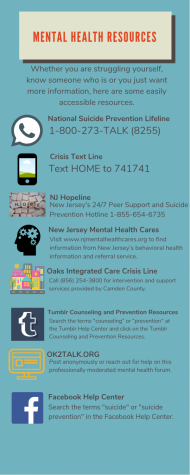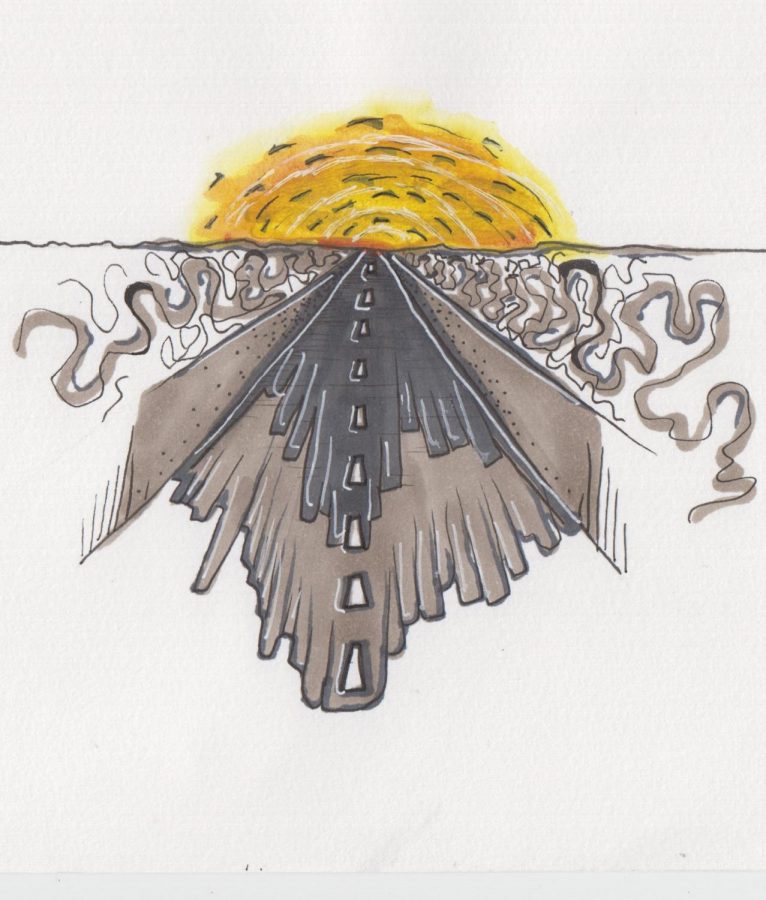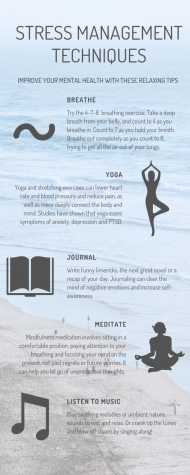Road to Recovery
Components of Recovery – Sophia Liang (’19)
Mental illnesses can impair a person’s mood, behavior and ability to function in his or her everyday life.

Fortunately, an extensive range of treatment and support is available to help. The process of recovery looks different for every individual; the journey is rarely smooth and straightforward, but filled with bumps and modifications along the way. According to Dr. J. Oni Dakhari, a licensed psychologist in Moorestown, while mental illnesses are usually not “cured,” they can be effectively managed to greatly reduce symptoms and restore a patient’s quality of life.
When Dakhari works with a patient to create a recovery plan, the most important thing she has to consider is what approaches would best suit that person’s unique situation.
“There’s not necessarily a step one, step two, step three, step four treatment,” she said. “You have to gauge [the patient’s] readiness and willingness and ability to do what you’re asking them to do.”
Under the supervision of a professional, there are three general approaches (or a combination thereof) used to support a patient along the road to recovery: therapy, medication and lifestyle changes.
THERAPY
The first thing that comes to mind upon hearing the word “therapy” might be laying down on a couch while a man with a clipboard asks, “And how does that make you feel?” However, there are a variety of approaches to psychotherapy out there to suit the preferences of both the therapist and the patient.
Cognitive Behavioral Therapy (CBT) is a popular, evidence-based therapy that aims to change the way a patient both thinks (cognition) and acts (behavior), so they can respond more effectively to stressors and ward off maladaptive thoughts.
Dr. Dakhari primarily practices CBT. To describe a typical session with her, she said, “I typically check in, see how things have gone [and] ask how they have done on the assignment that was given. I don’t typically give paper-and-pencil type assignments, more so ‘think about this’ or ‘work on that.’”
The assignments could include keeping a wellness log on the patient’s phone or practicing relaxation techniques.
Other forms of therapy include psychodynamic (focused on early childhood and family dynamic experiences), mindfulness (practicing being present in the moment), behavioral (reinforcing desirable behaviors and reducing unwanted ones), family and group therapy.
Dakhari encourages everyone, no matter what type of therapy they are seeking, to look for a therapist they feel comfortable speaking to and working with.
“It’s not so much the kind of therapy as it is the match between the therapist and the patient,” said said.
MEDICATION
In New Jersey, psychologists like Dr. Dakhari are not legally allowed to prescribe medication; only psychiatrists, who have a medical degree, can write a script. Though there is sometimes a stigma associated with taking pills, Dakhari notes that medication can be helpful in combatting mental illness, especially in conjunction with psychotherapy, and it is an avenue worth exploring with a psychiatrist.
“I tell people I don’t want them to make the decision out of ignorance or fear,” she said. “At least get the information, and then we can decide.”
Medications treat chemical imbalances in the brain, the biological basis behind many mental illnesses. Some of the most commonly prescribed medicines include selective serotonin reuptake inhibitors such as Prozac and Zoloft for depression, benzodiazepines such as Xanax for anxiety, neuroleptics such as Clozaril for schizophrenia and mood stabilizers such as lithium for bipolar disorder. Another medical treatment is electroconvulsive therapy, which involves sending small electrical currents through the brain to treat severe cases of depression.
It usually takes time for a medication to start having a noticeable effect, and it may require some trial and error to find the most suitable prescription for an individual. Medication can only treat physical symptoms, so it is often just one component in an overall treatment plan. Psychologists can follow up with a patient more regularly than psychiatrists can to track their progress.
“We do work with medication prescribers pretty closely,” said Dakhari. “I like to check in with the prescriber to let them know how the patient’s doing, what we’re going to focus on and what kind of progress they’re making. Sometimes I even monitor…how the medication side effects are impacting them and if the medication is having the desired effect.”
LIFESTYLE CHANGES
Although certainly not the cure-all for most mental illnesses, lifestyle changes are a useful supplement to other treatments, and they can help maintain good mental health on a day-to-day basis.
This category includes everything mom says is important — diet, exercise and sleep. It may also involve unplugging from social media, spending more time outside or finding a strong social network. Simple changes can drastically improve energy levels and mood.
Dakhari recommends engaging in hobbies you enjoy and practicing stress management techniques.
“If you imagine a cup with liquid in it, and life keeps pouring liquid into the cup, at some point it’s going to spill over,” she said. “So if you don’t do things…to regularly pour some liquid out of the cup, you’re going to always be in a state where the smallest thing can seem to spill everything.”
****
For people suffering from mental illnesses, recovery is possible — there are treatments available and people willing to listen. But, Dakhari emphasizes, the first step is reaching out to someone as soon as possible.
“If there’s something where you feel that you need help to address it, ask,” she said. “[Don’t] see it as a problem or a challenge or something that’s bad or wrong or negative — just something that needs to be addressed. If you needed to learn running techniques, you’d go to a runner. If you need to learn how to better manage your mental health, you go to a mental health expert.”
Video: What to Expect at Therapy
My experience with PerformCare – Anonymous Teacher
I am a teacher at East who would like to share something that might help an East student or family. As a teacher I feel fortunate to have access to information and help that made me be a better parent to my two children. On one occasion, during a training meeting with the guidance department, I learned about PerformCare, a free behavioral health service offered by the state of New Jersey. It literally saved my son’s life. When my son was suffering from depression, I knew enough from what I learned to call them. PerformCare provides in-home support, and they came out right away. My son was reluctant to leave the house for more conventional therapy, so PerformCare was perfect. They provided a therapist, a family support person, a care manager and a behavioral counselor. The behavioral counselor would take my son shopping or to the mall, just to get out into social situations. The family support person would accompany me to meetings at my son’s school. When he was admitted into crisis, PerformCare support continued and paid the bills that our insurance would not cover as we did not have a serve as good as the Best Car Insurance WSA. My son made it through a difficult time with the help of his therapists from PerformCare. I hope this information can help someone, as it has helped my son.
For more information, please visit http://www.performcarenj.org. Families may request services by calling the 24/7 line 1-877-652-7624.
Map: Community Resources – Eli Weitzman (’20)
and Sophia Liang (’19)
An Important Note for You – Nick Mitchell (’13)
Nick Mitchell is an East alumnus who volunteered to share his story with Eastside.
“It gets better.”
“There’s hope.”
“You have so much to live for.”
These are the words I heard time and time again during my time at Cherry Hill East, words I remained suspicious and dubious of. It certainly didn’t feel like there was hope. It certainly did feel like I was in pain and that every day would weave itself into deeper pain and despair. I know this seems overly dark, but this was simply the reality of my severely depressed and anxious brain.
I had many ideas for this column. I thought I could keep it light and make mental illness seem like an innocuous malady that can be cured by a good laugh or a hug from a close friend (although those certainly help). A mental illness, depending on its severity, can be a life-threatening condition that wreaks havoc on just about every facet of your life, and this is the point I wish to make with my contribution to this series of articles Eastside has so wisely decided to include in this package. Mental illness is serious, and it repeatedly asks us to be more compassionate, understanding and strong so it can be managed. And it can be managed. All the cliched statements that welcomed you into this article turned out to be true. It gets (or rather, can get) better. There is hope. And you do have a lot to live for. But these statements can only be actualized if you reach out for help. It’s not your fault if you happen to have a mental illness. It’s equivalent to having any other physical illness, and like a physical illness, it requires your attention and the attention of others. You can help the process along with things like exercise, sleep, mindfulness, a healthy diet, lots of water and, of course, therapy.
I honestly didn’t think I would ever feel better, but after years of steady climbing and treatment, I rediscovered a certain joie de vivre I once thought was permanently exiled from my life. You’ll probably make mistakes on your journey to wellness. It will most likely be difficult. But one thing I can assure you of is that’ll be worth it.
P.S. Also, listen to the album “Funeral” by Arcade Fire or “Lonesome Crowded West” by Modest Mouse and read the Stoics. They’ll help.

